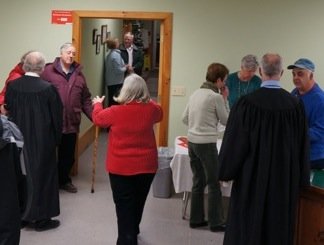Four-party backing in Rensselaerville
Rensselaerville town government began anew, as it does every year, during its reorganizational meeting, celebrated above, in January of this year. Kathleen Hallenbeck, in red at center, above, plans to retire after 40 years as the town clerk and tax collector.
Listen to the question-and-answer session of the Oct. 26 candidates' forum in Conkling Hall.
RENSSELAERVILLE — Republican Supervisor Valerie Lounsbury is unopposed seeking her first full term, and Kathleen Hallenbeck, the town’s clerk for 40 years, will not seek re-election this November.
Democrats are running two candidates for the two open seats on the council, but no one for supervisor. Two Democratic candidates, Gerald Wood for town council, and Victoria Kraker for town clerk and tax collector, also have backing from Republicans, Conservatives, and the county’s Independence Party.
John Kudlack, a town councilman and chair of the Democratic Committee, disapproved of Democratic candidates having Republican endorsement.
“It’s a conflict of politics,” said Kudlack. “The county committee frowns upon that.”
Democrats once dominated the board, but voters have put into office more Conservatives and Republicans in recent elections. Currently, there is one Democratic town board member, two Conservatives, one Independence Party member, and one Republican. Two men and three women make up the town’s governing council.
Paul Caputo, chairman of the Albany County Independence Party and vice chairman of the state party, told The Enterprise in July that he talks frequently about the political diversity of “the little town of Rensselaerville.”
“The folks on that town board really should be proud of themselves and, actually, it should be a model,” Caputo said.
Since Lounsbury was appointed in 2012, she and the board developed a budget that raised the tax levy just under the 2-percent cap. This year, the comptroller has said the cap must be 1.66 percent for municipalities with a fiscal year ending on Dec. 31.
Many of the town’s accounts had been disorganized, according to a report, covering mostly 2011, released this year by the state comptroller’s office. It detailed duplicated funds that overstated tax revenues, and inaccurate records as the town transitioned to a new accounting software, Munis (MUNicipal Information Systems), using two systems simultaneously.
Democrats Gerald Wood and Jeannette Rice, as well as Conservative Marion Cooke, are running for two open seats on town board, for $3000 each year.
Heather Kelly, a non-affiliated candidate, is running against Democrat Victoria Kraker to be the new town clerk and tax collector, for a $32,280 salary and a four-year term.
Republicans Michael Weber, Donna Kropp, and Kathryn Wank, along with Democrat Jeffry Pine, will all run for two open four-year terms as assessors, positions with pay ranging from $4,600 to just over $7,000 per year depending on certification and seniority.
Conservative Randall Bates, the incumbent highway superintendent, will run unopposed for a four-year term and an annual salary around $42,000.
Candidates for town board and supervisor were asked about their background, why they are seeking office, and the following issues:
— Budget: Last year, the town voted to exceed the 2-percent cap on any increase to the tax levy, but ultimately reached an increase just below it. Candidates were asked what changes in the budget they would suggest, if any, to stay under the cap, and whether the cap is sustainable for the town.
— Ethics: The assessor’s office was the subject of an ethics investigation this past year and the town board is reviewing changes to the board of ethics’ procedures. Candidates were asked whether any further review or changes to the assessor’s office or the ethics code are necessary.
— Preparedness: Many of the town’s hamlets are close to water, and some low-lying areas are considered flood plains that are vulnerable during heavy rains. Candidates were asked to what extent town government is responsible for mitigating damage to these areas and for cleaning up the damage caused by natural disasters, and what else could be done for disaster preparedness.
— Zoning: The town board has been reviewing the zoning law, drafted by the zoning board after parts of the code passed in 2007 was challenged in court but declared illegal because of the process used to enact it. One of the more controversial issues was on 20- versus five-acre density requirements for the agricultural district. Candidates were asked which of these, or any other zoning changes, they favor, and whether or not the zoning law should ban hydraulic fracturing.
— Information: The town’s newsletter was eliminated from the budget last year as a cost-saving measure. A special meeting was held in August to discuss possible alternatives to get information to residents. Candidates were asked what processing and distribution model the town should have for its news.


